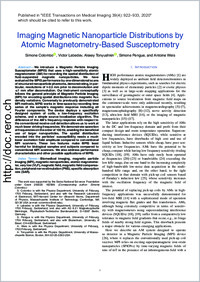Imaging magnetic nanoparticle distributions by atomic magnetometry-based susceptometry
- Colombo, Simone Physics Department, University of Fribourg, Fribourg, Switzerland
- Lebedev, Victor Physics Department, University of Fribourg, Fribourg, Switzerland
- Tonyushkin, Alexey Physics Department, University of Massachusetts Boston, Boston, MA, USA
- Pengue, Simone Physics Department, University of Fribourg, Fribourg, Switzerland
- Weis, Antoine Physics Department, University of Fribourg, Fribourg, Switzerland
-
2020
Published in:
- IEEE Transactions on Medical Imaging. - 2020, vol. 39, no. 4, p. 922–933
English
We introduce a Magnetic Particle Imaging Susceptometer (MPIS) that uses a high- sensitivity atomic magnetometer (AM) for recording the spatial distribution of fluid- suspended magnetic nanoparticles. We have evaluated the MPIS performance by one-dimensional scans of structured nanoparticle phantoms, demonstrating, in particular, resolutions of ≈2.5 mm prior to deconvolution and ≪1 mm after deconvolution. Our instrument conceptually follows the general principle of Magnetic Particle Imaging (MPI) for encoding spatial distributions into magnetic flux density variations. Conversely to previously demonstrated MPI methods, MPIS works in time- space by recording time series of the sample’s magnetic response including all Fourier components. The device deploys a specifically designed system of coils, a low-frequency excitation scheme, and a simple source localization algorithm. The difference of the AM’s frequency response with respect to the conventional receive coil detection allows us to work at much lower driving frequencies. We demonstrate operation at frequencies on the order of 100 Hz, enabling the beneficial use of larger nanoparticles. The spatial distribution encoded into the particles’ susceptibility needs a much lower excitation field amplitude compared to conventional MPI scanners. These two features make MPIS least harmful for biological samples and subjects compared to conventional MPI scanners. We also address performance characteristics and other possible applications of MPIS.
- Faculty
- Faculté des sciences et de médecine
- Department
- Département de Physique
- Language
-
- English
- Classification
- Physics
- License
-
License undefined
- Identifiers
-
- RERO DOC 328501
- DOI 10.1109/TMI.2019.2937670
- Persistent URL
- https://folia.unifr.ch/unifr/documents/308614
Statistics
Document views: 162
File downloads:
- pdf: 290
